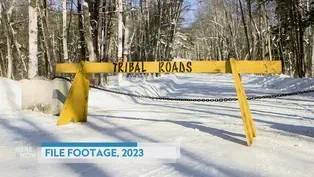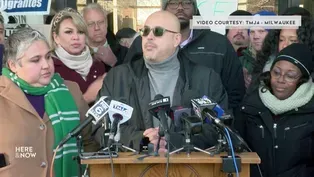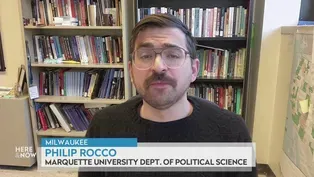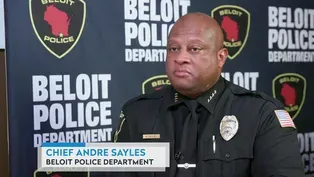Here and Now
Zac Schultz on Wisconsin's Separation of Powers Lawsuit
Clip: Season 2300 Episode 2327 | 6m 29sVideo has Closed Captions
Zac Schultz on a Wisconsin Supreme Court case on administrative rules in state government.
PBS Wisconsin senior political reporter Zac Schultz examines the Wisconsin Supreme Court case "Evers v. Marklein II" over who has power to set and strike down administrative rules in state government.
Problems with Closed Captions? Closed Captioning Feedback
Problems with Closed Captions? Closed Captioning Feedback
Here and Now is a local public television program presented by PBS Wisconsin
Here and Now
Zac Schultz on Wisconsin's Separation of Powers Lawsuit
Clip: Season 2300 Episode 2327 | 6m 29sVideo has Closed Captions
PBS Wisconsin senior political reporter Zac Schultz examines the Wisconsin Supreme Court case "Evers v. Marklein II" over who has power to set and strike down administrative rules in state government.
Problems with Closed Captions? Closed Captioning Feedback
How to Watch Here and Now
Here and Now is available to stream on pbs.org and the free PBS App, available on iPhone, Apple TV, Android TV, Android smartphones, Amazon Fire TV, Amazon Fire Tablet, Roku, Samsung Smart TV, and Vizio.
Providing Support for PBS.org
Learn Moreabout PBS online sponsorship>> Even a casual observer could conclude the relationship between the Republican legislature and the Democratic governor is dysfunctional in Wisconsin.
Long stretches where they don't talk to each other, lawsuits, vetoes, and end arounds to get their ways.
Now, the very balance of power between the legislature and the executive branch is in the hands of the Wisconsin Supreme Court with a series of cases having to do with whether administrative rules can be effectively vetoed by the legislature.
It's a lot to unpack, and here to do it, senior political reporter Zach Schultz, who joins us from the Supreme Court.
Hi, Zach.
Hello, Fred.
So first describe the kinds of rules and over what that we're talking about.
>> Well, the particular cases the Supreme Court heard this week, one of them was a rule about building codes.
And another rule had to do with a ban on conversion therapy, which is a type of therapy that tries to convince LGBTQ people that they are actually straight people.
And the state wanted to ban that.
And it's a committee in the legislature that Waukesha the Joint Committee for the Review of Administrative Rules.
It's a small committee with just a handful of members that can eventually put a hold on any of these rules coming out of administrative agencies and stop them from taking effect.
And when they do that, it's in effect, a legislative veto over administrative power.
And the Supreme Court is trying to weigh whether that's too much, whether that's actually allowed under the Constitution, and where that balance of power should reside.
>> So what has the Republican majority joint Committee on Review of these rules been able to do with some of Evers authority to set various rules?
>> Well, they basically have been able to put them on hold.
They have various authority.
When a rule goes into place, they can call the committee into action and they can hold the rule.
They can suspend it for a short amount of time, or they can suspend it for up to the full two year legislative cycle and then come back into the next session and suspend it again, which effectively creates a permanent suspension of the rule.
All they have to do is introduce a bill in the legislature that would overrule the rule, and that gets put on the table, it gets held and it has a hearing committee goes nowhere.
And effectively the rule is suspended.
The ban on conversion therapy, for instance, was first introduced in 2020, and it's only been in effect for a handful of weeks over the nearly five years since then.
Because Jcar keeps coming in and suspending it, it's in effect for the moment.
Right now.
But starting tomorrow, they can come back into session and put a hold on that rule, and then it will be suspended for as long as they want, possibly the next two years.
>> So a potential swing vote on the court in the way of justice, Bryan Hagedorn said during oral arguments that this decision is especially consequential for the operation of government.
Describe how.
>> Well, the kind of goes back to the bedrock of how we create laws.
The legislature could pass a law, the governor can veto it.
If the governor signs it.
Often the law is broad, and then there are agencies.
The DNR or the Department of Health and Family Services.
They have to create rules that carry out how those laws apply to businesses and people throughout the state.
Those rules effectively have the power of law behind them, and often they can become very granular and specific.
And sometimes it takes years to promulgate or create that rule and put it into place.
But then this legislative committee can come back and veto that rule and just send it back, and it goes nowhere.
So it's a legislative veto on administrative power.
If the Supreme Court decides that that no longer applies, then the rules from the administration go into effect, essentially with the power of law.
And that could reshape what the legislature writes into their own laws.
And that balance of power, of how the two branches of government work together.
allowed such power under the Wisconsin Constitution or other courts case precedent?
>> Well, the one that they're looking at the most is a Supreme Court decision from 1992 called Martinez.
And the question is whether they should overturn that rule or just adjust it slightly, because the power of this committee did grow in the Walker era, he gave them more expansive powers to hold and suspend some of these rules for longer.
But even Hagedorn in his comments from during oral arguments, said that there really is no basis for this relationship in the Constitution.
He called it a gentleman's agreement between the two branches of government, of how they would go about doing it, because since 1992, when the legislature has created laws, they've done it with the understanding that when it comes to creating rules under that law, of how it would be applied, the legislature would have some sort of say over what those rules said, and that could shift what kind of laws they write and what how old laws are interpreted under rules.
>> So this court could change the current balance of power as we know it.
>> Absolutely, fundamentally change, especially the way that the makeup has been in the six years we've had with Governor Evers in power and with Republicans in control of the legislature.
So certainly the next two years going forward.
But fundamentally beyond the timescale of this, because if they change the way this works, then that's a Supreme Court decision, just like Martinez was on the books for 30 some years.
This could be on the books for generations to come.
Future administrations, either Republican or Democratic governors and legislatures of either party, would be under this same system, having to figure out how does it apply, how do they write a law and how do they create a rule that is fair for everyone?
also released a decision on whether the names and addresses of people deemed incompetent to vote should be made public.
What did they do with that case?
>> Essentially, the Supreme Court of Appeals.
It's kind of a convoluted case.
The essence of it is whether a conservative voter interest group could get access to the records of all those voters, all those people in the state that are deemed incompetent to vote, and whether they could then check those names against the voter registration rolls to determine if someone was voting on their behalf, if they're not supposed to be a court of appeals.
And Madison said, no, you don't.
You don't have a right to those those are privacy issues.
A second court of appeals in Waukesha, a conservative one, said, no, we think you have a right to those.
The Supreme Court kicked it back and said, you can't overrule one Supreme 1 appeals court.
Do it right, and then we'll decide if we take the case properly.
So for right now, they don't have access to those records.
That's the status quo for the moment.
>> All right.
Well thank you.
Thank you for all your reporting
Federal Judge Orders Lac du Flambeau Roads to Remain Open
Video has Closed Captions
A federal judge said Lac du Flambeau roads must remain open while a ruling is pending. (1m 1s)
Here & Now opening for January 17, 2025
Video has Closed Captions
The introduction to the January 17, 2025 episode of Here & Now. (1m 1s)
Local Officials Voice Concern Over Mass Deportation Plans
Video has Closed Captions
José Pérez and Ismael Ozanne speak to local concerns over mass deportation plans. (1m 43s)
Philip Rocco on Shared Revenue Shortfall Issues in Wisconsin
Video has Closed Captions
Philip Rocco on Wisconsin's 2023 shared revenue deal to boost local government funding. (5m 37s)
Seasonal Respiratory Viruses Are Peaking for Young Children
Video has Closed Captions
Seasonal respiratory viruses are spreading across Wisconsin as authorities monitor H5N1. (2m 1s)
Chief Andre Sayles on Beloit Police and Immigration Status
Video has Closed Captions
Andre Sayles on policing practices toward undocumented immigrants in the city of Beloit. (11m 37s)
Providing Support for PBS.org
Learn Moreabout PBS online sponsorshipHere and Now is a local public television program presented by PBS Wisconsin

















